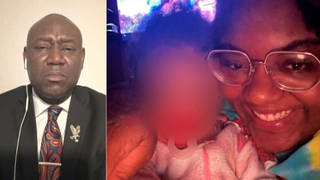
By Amy Goodman & Denis Moynihan
Ten people were slaughtered in Buffalo last Saturday, killed at a supermarket in the heart of the Black community. The gunman: an 18-year-old self-professed white supremacist armed with a legally-purchased Bushmaster AR-15-style semiautomatic rifle. His goal, based on a rambling, poisonous 180-page document he posted online, was to “kill as many Blacks as possible.” Of the 13 victims (including three who were injured), eleven were African American. The killer live-streamed the massacre on the social media video website Twitch. While the Amazon-owned site pulled down the gruesome video within minutes, it was immediately posted then accessed by millions on other internet platforms.
Challenging racist violence demands an understanding of our true history. Instead, a vocal minority in our country are demanding not gun bans but book bans, trying to suppress the teaching of our country’s deep-seated, systemic racism.
The Buffalo shooter espoused a conspiracy theory known as “The Great Replacement,” which wrongly posits that traditional, native-born white majorities are being replaced by people of color, immigrants, Jews and Muslims, aided and abetted by a leftwing globalist elite. This new population, the racist replacement theory maintains, compliantly votes according to the dictates of their supposed Democratic Party sponsors.
The killer, who is in custody, directed his animus at “replacers,” as he called them, principally African Americans. His slapdash screed, which borrows heavily from another one posted by the racist mass murderer who perpetrated the Christchurch, New Zealand mosque massacres in 2019, betrays a profound ignorance of the history of race and racism in this country.
“This crisis of white supremacist domestic terror is likely to get worse,” Ibram X. Kendi, founding director of the Boston University Center for Antiracist Research, warned on the Democracy Now! news hour. “Studies have shown that antiracist education, that antiracist books serve in a protective fashion, particularly for white youth, when they are exposed to white supremacy, because through learning about the history of white supremacy, they’re better able to recognize it.”
Several of Kendi’s books have been banned or targeted for removal from school curricula and libraries, including the National Book Award-winning “Stamped from the Beginning: The Definitive History of Racist Ideas in America.” Texas Senator Ted Cruz drove Kendi’s children’s book “Antiracist Baby” onto bestseller lists after denouncing it and several other books during the Senate confirmation hearings of African American Supreme Court nominee Ketanji Brown Jackson.
Professor Kendi continued, “Antiracist education, first and foremost, is teaching children about the history of white supremacist ideology, the role that white supremacist ideology played in racial slavery, in settler colonialism, in Jim Crow…It’s teaching children our racial reality, so that they can see that, though we look different, though we maybe speak differently, we’re all equals, but the cause of these inequities are indeed racism.”
The domestic terrorist in this case reportely chose Buffalo after searching zip codes close to his overwhelmingy white hometown of Conklin, New York. He then traveled several hours to Buffalo’s Kingsley neighborhood, and targeted the Tops Friendly Market on Jefferson Avenue. Why the supermarket? India Walton, a former Buffalo mayoral candidate and Senior Strategic Organizer with the progressive organization RootsAction, explained on Democracy Now!:
“We know that 80% of the population of the East Side of Buffalo are people of color, are Black people specifically, and they have one place to shop…We have dubbed it ‘food apartheid,’ because it is a policy decision. The fact that there is no food on the East Side of Buffalo and there’s not the availability of these basic services is a policy choice. There are people who actively chose to not provide services in this community. For a long time, we’ve been told that this Tops on Jefferson, we are lucky to have it, because no one else wants to come into the neighborhood.”
The Buffalo mass murderer also considered additional targets, either a church or a school. According to online chats attributed to him, he feared the school would have too much security. Fortunately, he was stopped at the supermarket.
“White supremacists are making the case that it’s the people of color, that they’re the source of their pain, which is something that many of these young white male supremacists are being indoctrinated on, groomed on, and thereby carrying out mass shootings,” Ibram X. Kendi said. “This is only going to get worse if we don’t get a handle on it.”
Limiting access to guns and expanding access to education about the role of racism in our society, and learning, as Ibram X. Kendi’s book title suggests, “How to Be an Anti-Racist,” are fundamental steps to stem the horror of hate and heal these long-festering wounds.












Media Options